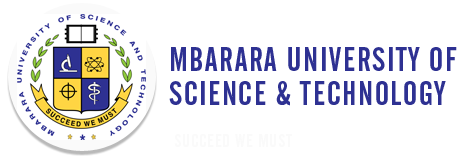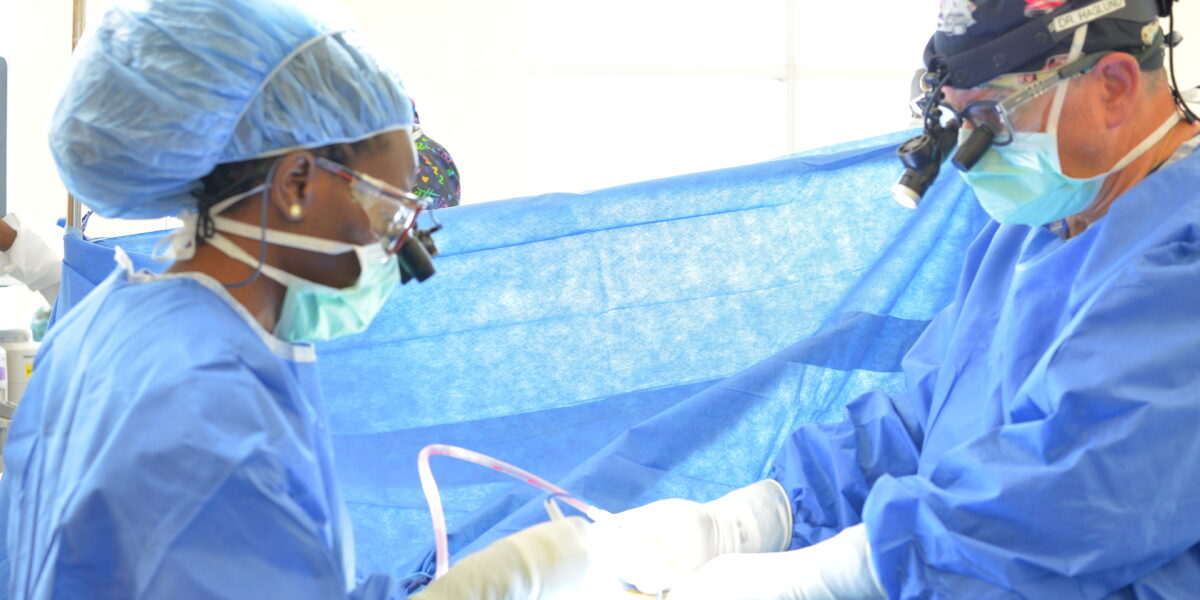On October 28 2023, Mbarara University of Science and Technology (MUST) and Mbarara Regional Referral Hospital (MRRH) hosted the team from Duke Global Neurosurgery and Neurology (DGNN). The team travelled to support the Ugandan team of neurosurgeons in a 5-day camp. The two teams handled neuro challenges that included complex brain tumors, spine conditions notwithstanding skills enhancement and transfer.
Leaders of the camp
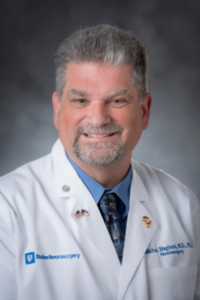
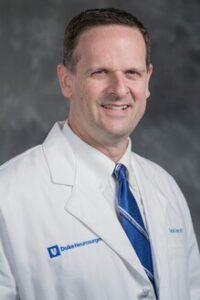
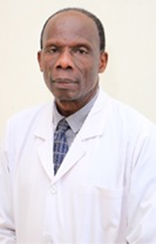
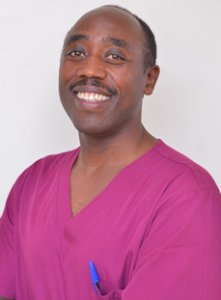
L-R: Prof. Haglund Michael, Prof. Gerald Grant, Prof. David Kitya, and Dr. Michael Blessing Taremwa.
The hosting team MUST/MRRH was led by Prof. David Kitya, a Professor and head of the division of Neurosurgery in the department of Surgery at MUST where he has worked since October 1993 as an academic. He has risen through the academic ranks over the years becoming a senior Lecturer in December 2001, acting head of the department from 1999–2002, and Associate Professor in 2004 and full Professor of Surgery in 2023. From October 2008-2011, Prof. Kitya trained in neurosurgery at Kenya National Referral Hospital (KNRH) in the department of Surgery.
He has also been recognized by the College of Surgeons of East, Central, and Southern Africa (COSECSA). Currently, Prof. Kitya is the Head of Neurosurgery at Mbarara Regional Referral Hospital (MRRH) and has great experience in trauma, spine and neurosurgery.
He is also an associated with Duke Global Neurosurgery and Neurology, which aims to promote health in low and middle-income countries through a multi-faceted evidence-based, and collaborative approaches to improve patient access to care and health outcomes, strengthen health systems, and inform policy.
He is also the president of the division of Neurosurgical Society of Uganda (NSU).
The DGNN team was led by Prof. Haglund Michael: He is a Duke Health Surgery Distinguished Professor of Neurosurgery in the School of Medicine, Neurosurgery since 2012, Professor of Neurosurgery since 2008, Research Professor of Global Health, Duke Global Health Institute since 2011.
He has provided neurosurgical care at Duke Health since 1995 with the majority of that time focused on cervical spine disorders. He has performed over 6,500 cervical spine procedures and performed approximately 350 cervical spine surgeries per year, focusing on great outcomes and short stays. He has been recognized as the top cervical spine surgeon in the US by MPIRICA Health Inc. based on his outcomes.
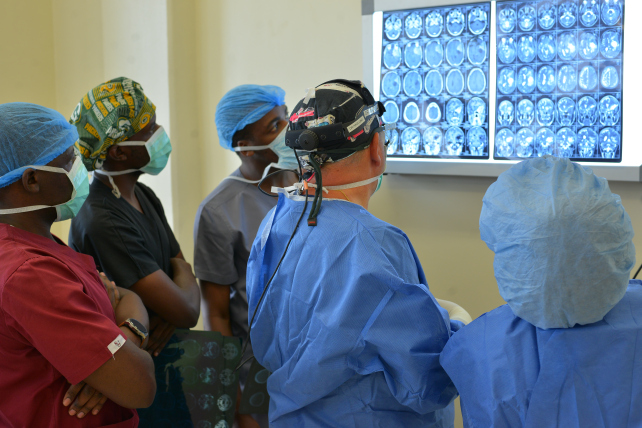
The two chiefs were assisted by Dr. Gerald Grant and Dr. Michael Blessing Taremwa. Dr. Grant Gerald is a member of the Stanford Cancer Institute, Stanford Neurosciences Institute, Bio-X and Child Health Research Institute at Stanford. Grant is a Diplomat of the American Board of Neurological Surgery and is also board certified in Pediatric Neurosurgery by the American Board of Pediatric Neurological Surgery.
Dr. Michael Blessing Taremwa is a neurosurgeon at MRRH and MUST. He is specially trained to diagnose and treat conditions that affect the nervous system. He specializes in complex skull base and cerebrovascular surgery on the skull, spinal vertebrae, spinal disks, blood vessels and protective membranes and soft tissues.
The other senior surgeons included;
- Dr Ali Zomorodi, a Neurosurgeon in Raleigh, NC. He specializes in Skull base surgery.
- Dr Simon Mukuye, MBchB(MUST), MCS(ECSA), FCS NS(ECSA), Neurosurgeon at Mbarara Hospital.
- Dr Lydia Nanjura, MBchB(MUST), MCS(ECSA), FCS NS(ECSA), Neurosurgeon at Mengo Hospital
4.Dr Kiryabwire Joel, Neurosurgeon at Mulago Hospital
According to one of the camp coordinators, a resident in the camp Dr. Ssembatya, patients received information mainly through social media. A flyer was shared on social media with details of the camp. Patients with neuro-challenges were required to have medical evaluation to ascertain their medical conditions. “The patients would call the given numbers, for more details. The main evaluation centre was Mbarara Regional Referral hospital, whereas a liaison office for patients from the northern, Eastern and Central parts of Uganda was established at Mulago National Referral Hospital” Said Ssembatya .
He added that at the evaluation centres, the patients were categorized according to their conditions such as immediate intervention, conservative management, referral to the next camp.
“The numbers were overwhelming, and most patients could not afford some laboratory tests notwithstanding the MRI scan. The camp was so timely for Ugandans and I believe it’s going to impact many”.
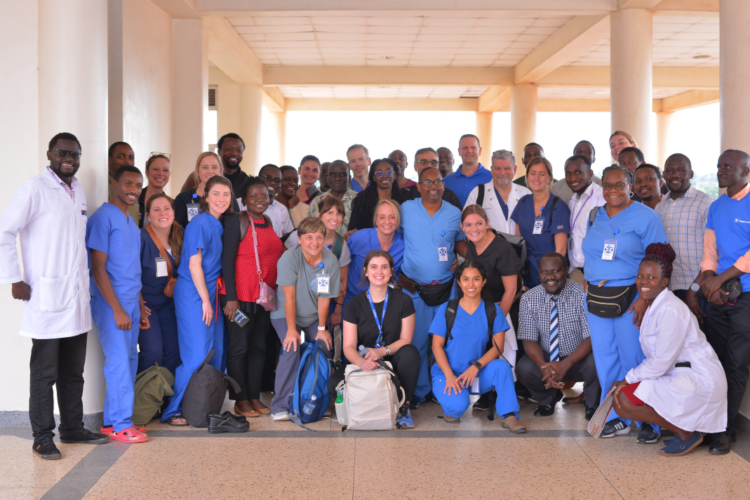
He pointed out that the support from DGNN was full board, which gave the patients a chance to receive not only the best surgeons but also medical support until discharge.
A meeting of the 3 parties was held to discuss the future of the collaboration. These included the MRRH team, MUST and the DGNN. Different departments shared their experience in relation to neuro specialized clinics.
Dr. Adrian Kayanja, the in-charge of the MRRH epilepsy centre of excellence said the clinic has greatly improved in terms of patient attendance and consistence, notwithstanding the referral cases. The clinic days are divided into adults and children i.e Tuesday and Wednesday respectively. Thursday and Friday is EEG day.
Dr. Kayanja added that the clinic also handles education and research for both undergraduate students and postgraduates. He said the studies contribute greatly to the awareness of the disease burden to policy makers, health workers and the community.
Kayanja pointed out one of the prevalence studies conducted by DGNN: Epilepsy & Behavior Volume 140, March 2023, 109096 titled “Walking the Journey Together”: Creating a unique learning module in provider-patient communication for the care of epilepsy in Uganda”.
“’This created awareness of epilepsy in our community and also gave hope to its management through the specialized clinics available”. Said Kayanja. For more details on the study kindly check the link: https://www.sciencedirect.com/science/article/abs/pii/S1525505023000148
He acknowledged the support from DGNN, saying if it were not for their support, they could not have achieved the milestone by far.
His presentation was supported by Dr. Peter Kalubi the pediatrician in charge of the children’s epileptic clinic. He said through DGNN, some staff at the clinic have been supported and medication has been provided training in the field through exchange programs with onsite mentorship have greatly impacted the clinic.
Both Doctors Kayanja and Kalubi pointed out the challenges at the clinic mainly caused by the increase in numbers of patients which include:
- Limited space at the clinic to facilitate the increasing numbers of patients.
- Limited number of staff at the clinic to efficiently handle the clinic.
- Stock outs of medicines still due to the increasing numbers.
The team has engaged the hospital management through the hospital director and pharmacies to increase on the epileptic drug orders.
Prof. David Kitya, head of neurosurgery at MRRH/MUST acknowledged the unique offerings of the neurosurgical society in Uganda, thanking Duke Global Neurosurgery and Neurology for their support in advancing mobile clinical services. He also thanked the hospital administration for the support rendered especially with the epileptic clinic management, research, mentorship and now the camp which has given hope to the community and brought visibility of the services rendered at the hospital/ University.
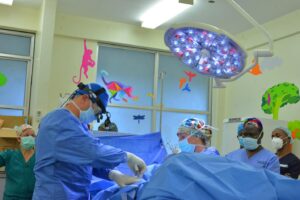
On behalf of the Hospital Director, Dr. Francis Oriokot also acknowledged the support from DGNN. To this, he attributed improving health care in South Western Uganda region and Uganda as a whole. Dr. Francis representing MRRH Director, pledged full support as and of when the Duke team will be around. He thanked Prof. Kitya and his team for attracting such notable and impactful partners.
On behalf of the DGNN Prof. Michael Haglund thanked both teams for the warm reception. He noted that he had high hopes this was going to touch so many lives in Uganda. The collaboration has a dream of fostering stronger ties by training 60 neurosurgeons and establishing 3 neurosurgery centers in Uganda by 2030.
He also added that the dream of this collaboration is to build a Uganda Neuroscience institute which will house neurosurgery and neurology services. The vision is to have safe clinical care, research and education. It will be a center of excellence in Africa. He shared the artistic impression, and architectural design.
Closing in Unity: Assoc. Prof. Joseph Ngonzi, the Dean Faculty of Medicine at MUST, extended his appreciation for the ongoing support and pledged support as the Faculty of Medicine especially in relation to training, research and community engagement. He called for collaborative efforts towards a distinguished neuroscience institute as echoed in the closing remarks of the meeting.
Joseph said he cannot wait to see the face of Mbarara City change with the new iconic building of neurosurgery notwithstanding the services it is going to provide to the region. “The artistic impression of the new neurosurgery center shows a state of the art center with all services in one place. This will offload a huge load of burden off the shoulders of caretakers moving with patients for medical services like: laboratory, radiology services, pharmacy, restaurant, relaxation area and many other places.”
The initiative, a collaboration among 3 parties, that is, Mbarara University of Science and Technology, Mbarara Regional Referral Hospital, and Duke Global Neurology and Neurosurgery, was led by specialists from Duke Global Neurology and the Regional Hospital.
Neuro surgeries are quite pricey. As such, when the opportunity manifested, many turned up for medical evaluation. Appearing on the theatre list called for celebration and tears of joy. The target was 50 patients for surgery and carefully the MUST, MRRH and DGNN team through the patient’s histories, examinations, and a thorough review of imaging studies, the team was able to use that process to plan on whether conservative care or possible surgery will relieve their pain and get them back to living at their best. Other patients were referred to the next camp likely to take place in April 2024. The camp handled all ages, men, women and children. This is what some of them had to say;
Mbabazi, a 61-year-old from Bukanga had had headache for 30 years. She kept on pain killers to control the pain. About a decade ago Mbabazi was told that she was hypertensive and was started on medication. She got eye issues and shortly after lost her sight. She went to the eye clinic at Ruharo hospital. The Doctors there told her that the impairment was more serious than she thought. She was referred to MRRH, specifically to Assoc. Prof. Kitya.
Dr. Kitya diagnosed a tumor in her head and noted it was the reason as to why she had headaches, and had later lost her sight. She continued taking painkillers until June 2023 when she returned to the hospital and a SHUNT was put in her head. She was told to return in September 2023 and be evaluated for surgery. Both teams MUST and Duke recommended surgery. Mbabazi was worked upon and this was day 3 after the surgery.
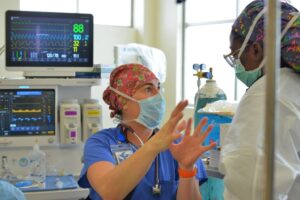
Acknowledgement: “Please thank Prof. Kitya for me. I am so speechless. He brought the ‘bazungu’ to work on me. People fly to go have medication abroad, for my case they are the whites that came to work on me. ‘who am I?’. I thank God for the gift of doctors. They have given me a chance to live again after I had lost hope in life. I recited my rosary praying to mother Mary for the pain to go away but my prayers we answered in a different way. I cannot wait to get home and tell my friends about this miracle. I still have pain especially around the place they cut. Maybe a question to the doctors when will they take out the shunt from my head?”.
“As a family we are so grateful to the almighty for a miracle granted to our mother. We were referred to Kampala for an MRI but we could not afford it, not even the transport. On Friday before mother’s surgery we were told to do a scan, still we could not afford it. In the morning they came for her to go for surgery. We were scared to tell them we did not do the scan thinking it was part of the surgery procedures on top of not eating at night. We are grateful everything was provided to us. Medication was free, the surgery was free, and we were on a special bed that moves. We feel special, these people cared a lot for us, checked on us every now and again. Glory be to God,” Said Rita her daughter in law.
Interview with Mr. Stephen, father to Maha. Maha, is 1-year-and-3-months-old Maha Terisa is a daughter to Stephen.
We observed that at 4 months, she started getting strong jerks that would curve her arms to the feet. She was taken for treatment and most doctors thought it was pneumonia.
A family friend recommended to them Dr. Lubega in Bwaise. On the first visit he requested for an EEG which was done and showed that Maha had epilepsy. She was started on medication and there was a big improvement, her appetite too doubled and breast milk was not enough. She was fed more on other foods and the breast milk was the supplement. All this happened at 8 months.
They then went to Bethesda hospital opposite Makerere University gate. The given medication greatly reduced the jerks from about 10 episodes to like 2 a day,
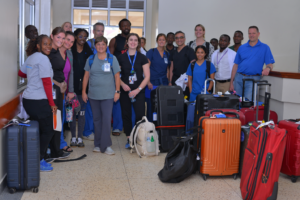
When Stephen and his family relocated to Kasese District. Maha resumed with more jerks. They could not consult on phone since the doctors required to see the patient physically. She was then taken to Kagando Hospital where they met Dr. Odongo, a senior pediatrician. He requested for a CT scan so the family travelled to Mbarara District, specifically to Mayanja memorial hospital. “The gentleman doing the CT scan told us about prof. Kitya and that he was around,” Stephen retorted. After doing the scan Stephen met him. He interpreted the scan and told them that Maha needed surgery. The father lost hope because he had earlier on been told, that the outcome of the scan would require immediate attention which meant starting Maha on expensive medication or undergoing surgery which he had been told would cost not less than 12 million, an amount he could not afford.
In a soft and calm voice Assoc. prof. Kitya lifted the spirits of Stephen by telling him about the camp in September. Maha had surgery on Wednesday November 1, 2023. The jerks had reduced in number and strength.
“May God bless the surgeons!. Through the camp, I have been able to understand Neuro challenges and how they can be handled. This is because the doctors take time to explain to you what is happening and what will happen without the surgery and after the surgery. My daughter is better at no cost, how can I ever thank you people, I have also gotten to believe in the statement that God works in mysterious ways and His timing is always perfect, me going to Mayanja memorial for a scan and I find the senior consultant who gave me a solution there and then was GOD’s will”
Fortunate 61-year-old female from Rwampara is a retired teacher. Her life changed in June 2023 when she hit her head on the walls of the kitchen. She was rushed to a clinic and managed for the pain. She was referred to Itojo hospital where she was asked to do an x- RAY scan. It showed she had a blood clot. Fortunate said she had some of the blood drained using syringes and continued taking pain killers. However, the mass was increasing by day up to the size of a fist.
A friend told her about the camp. She came to Mbarara and found young doctors who were so empathetic and good listeners. Fortunate read name tags and remembers these as Dr. Ssetuba, Dr. Bbosa and a young lady whose name she cannot recall. She said the young doctors asked her for a CT scan.
She commended the Doctors for giving her time, talking to her and explaining everything in detail. On doing the scan, they explained to her clearly what was happening and why the swelling was increasing and options she had. The doctors then referred her to prof. Kitya. He recommended surgery and told her about the camp. She was told to return September 25, 2023.
“Dear doctors, you are my second saviors, thank you for taking away the pain, I could not sleep at night because of joy. I pray and wish the almighty rewards you immensely”
Spe a 57-year-old female from Mbale District had pain of the left leg and back pain since 2003. On 1st October she started getting heat in the leg and constant muscle pulls. She was taken to Kumi hospital and she was seen by Dr. Opolot. who managed the pain. The intervention worked for some time. However, the pain persisted and they recommended her for surgery in Kumi Hospital. Her husband was hesitant to make the decision with fear of further complications. He advised her to hold on a little longer.
Spe was so puzzled about this pain, she says she gave birth to 7 children and never had a problem. Why then get the problem now? She got a call from her son who is a doctor in Mbarara telling her about the camp. She came for the medical evaluation and surgery was recommended.
“I cannot thank you enough, I still have pain but not as before. The doctors come and help me exercise, the others come to check on me for feedback, I get super attention. I thank God for this, may He bless you for the good work done. Let us leave the rest to him because healing is a process”
Joseph, 37, year old from Kaberamaido had been battling severe headaches and hearing loss for two years. After an extensive medical journey, including tests and consultations at various hospitals, he was diagnosed with a tumor. The cost of the necessary surgery was beyond the means of his family. Upon hearing about the camp in Mulago, he sought treatment there and received the necessary care at no cost, alleviating his pain and offering hope. He was told to come to Mbarara. He travelled by the ferry from Namasagali to Nakasongola. The determined patient got to Mbarara on October 17, 2023, a week earlier than the camp start date.
He was examined by Dr. Cathy, Dr. Tomson, and Dr. Moro. They referred him to Dr. Kitya who recommended surgery, a decision not different from what the Mulago team had made. He and his brother found it cost effective to stay in the land of milk and honey as they waited for the camp day. The Duke team too did a medical assessment and indeed Joseph needed surgery. He was admitted on October 25, 2023 and on October 26 2023, he underwent surgery.
“Thank you! thank you! thank you! may God bless you all. As a family we had lost hope for my brother., We spent a lot of money on him. I personally gave up on my work to take care of him since he had partially lost his sight and hearing. Communication was by writing. We could not afford further management. One of the doctors asked for surgery and it would cost us close to 800,000. Moving with him was a challenge. Here came the camp. Its two days now he said he could hear the beeps of the machines the medical camp. They not only provided critical surgical intervention but also emerged as a beacon of hope for individuals and families facing challenging medical conditions, rendering essential healthcare accessible to those in need our family benefited a lot. May God bless you for giving hope to us for hope for our brother was long gone. I have learnt not to give up, I have learnt that when you are facing a challenge someone elsewhere has the same problem what makes a difference is not to give up. Allow me to also thank Dr. Ssembatya. He is a doctor here., Every time he comes to check on us he gives us hope. He doesn’t want us to be sad. He speaks with energy to encourage the patient he use Luganda expressions of hope and jokes. I can say he is a happy man and he want everyone to be happy; he explains to you everything very clearly. I heard one of the doctors say he might be late today because his wife had a baby, may God bless his child never to lack, just as he blessed us with hope.” Joel brother to Joseph
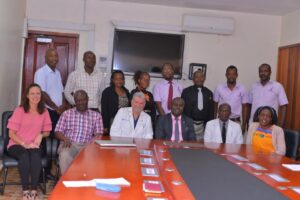
Edson ,28 years. From Kabale District was diagnosed with a brain tumor in May 2022. In June 2022, he got recurrent headaches. He decided to go to Rugarama Hospital in Kabale. Unfortunately, the doctors could not identify the disease. They gave him pain killers and the pain reduced for a while. In May 2023 he collapsed and was rushed to Kabale Regional Referral Hospital and was admitted for a week. On doing the CT scan which reviled a tumor in the head.
Edison was referred to Mulago National Referral Hospital while there, he received medication and later a shunt he felt better and successfully returned to his home town in Kabale. By then Edson had lost his sight and need support all the time. his brother Martin took on the mantle of supporting his brother. Being a teacher in a special needs school he had the exposure to work with people with impairments
One day while at school one of his students shared her story of secondary visual impairment. She said that most of the medical attention she got to correct the impairment was from Mbarara Regional Referral hospital. (MRRH). she then shared the contact of Doctor Tomson from MRRH. He immediately got in touch with him and an appointment was fixed for him and the brother. This was timely because after evaluating his medical condition he was told to stay and benefit from the medical neurosurgery camp which was in a week’s time.
Martin: I am grateful to God for my brother’s second chance through the this camp. I wouldn’t have managed the medical expenditures, emotional stress maintenance of the other bills. God’s timing is perfect. This camp has taught me never to loose hope. The doctors are so kind, the explain everything to detail. I thank Professor. Kitya for his time, the doctors who check on us like Dr. Sematya, and another slender and tall doctor always giving us hope, even when she is pricking the patient she extremely careful, and keeps talking to the patient every step of administering medication, mbwenu, me I am happy and I thank the Almighty god for the medical teams. While in Kabale the doctor told me Edson will need surgery and approximately this was to cost us about 20 million- 30 million UGX. If it wasn’t for the free medical camp Edson was going to be managed at at home. While here it is not only Edson that has benefited I have learnt how to monitor the blood pressure, read the oxygen levels and be able to know when it is bad or when it is normal
